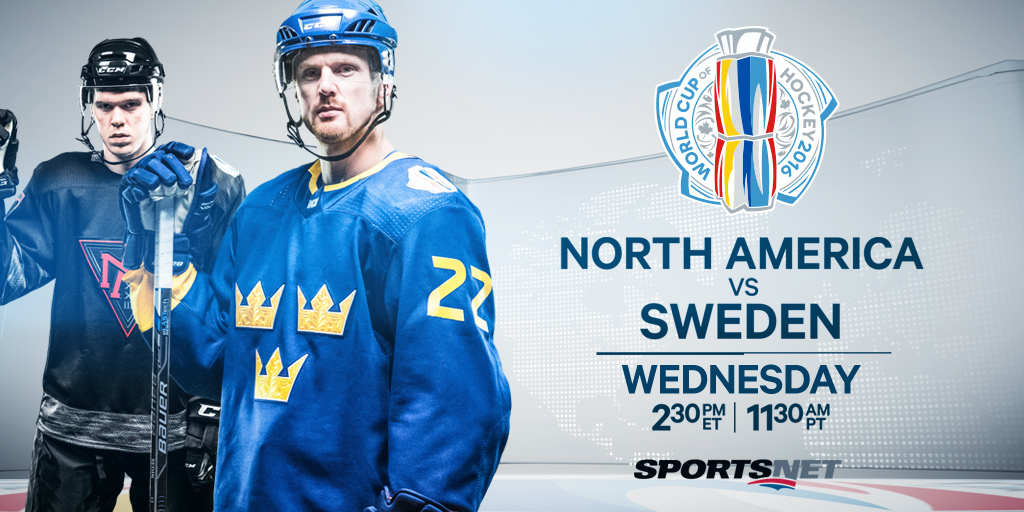TORONTO — It has become the great hockey cliché when an important player gets hurt, that everyone else simply “picks up the slack.” That one player cannot make up for the loss, so 20 must “rise to the challenge.”
Every once in a while, however, a Carey Price goes down in Montreal, and nobody rises. Or a Connor McDavid goes down in Edmonton, and it quickly becomes clear that there is no replacing a player of that pedigree.
Aaron Ekblad, Team North America’s silky smooth No. 1 defenceman, is out of the World Cup of Hockey with a neck injury, and he will not return.
What now?
“You keep moving on,” said McDavid, North America’s captain. “He’s a huge piece of our team. We miss him a lot. But it will be up to us to march on without him.”

It is a wide-ranging blow to any team to lose its No. 1 defenceman. That means changes on the power play, penalty kill, a new partner for Morgan Rielly on the top pairing…
The good news is Jacob Trouba, who drew into the lineup in Ekblad’s stead on Monday, isn’t exactly a No. 7 defenceman or some guy coming up from the minors who has never played special teams at this level before. So, on an all-star team like this, perhaps asking everyone to “step up” becomes less of a cliché than it would be on an NHL club team.
“Everybody on this team is used to playing more than (they are here),” reasoned Trouba. “There are 60 minutes in a game. If you add up everyone’s average ice time last year, everyone is used to playing a bit more. They can handle it.”
Just for fun, we brought out the calculator. The remaining six healthy Team North America blueliners averaged 22:00 minutes of NHL ice time per game last season, totalling a combined 132 minutes.
So even with Ekblad’s injury, every North American defenceman will likely still play less than he will average this coming NHL season versus Sweden. That’s the good news.
The bad news? Defenceman Ryan Murray left the practice ice midway through Tuesday’s workout and didn’t return. Head coach Todd McLellan called it a “maintenance day,” but usually maintenance days don’t involve practicing at all.
We’re just throwing this out there, but would taking on the Swedes with five defencemen be a problem?
“Yeah,” Trouba said dryly. “You usually want six.”
There are no call-ups until you lose three players to injury here at the World Cup. So the kids who have schooled their elders with all their speed and skill will now have to learn a lesson of their own in handling adversity.
“You have to learn on the fly a little bit,” admits Rielly, who becomes the de facto No. 1 here, paired with the surprisingly strong Colton Parayko in Monday’s 4-3 loss to Russia. “We all play on teams that have people getting hurt. In (the NHL) you have to call guys up from the minors, but in this case we’ve got Jacob Trouba, who is an outstanding defenceman who played really well (versus Russia).
“But in a short tournament like this the whole team has to be prepared to play more minutes and rise to the challenge and take care of each other defensively.”
Indeed, this tournament has become very short for North America, which went 1-1 in its first two games. Wednesday’s matchup against Sweden is basically a must-win. (The perfect storm could see them advance with a 1-2 record, but that outcome is highly unlikely.)
“It’s pretty simple: win or go home,” said McDavid, who is comfortable with that lot — even against an international powerhouse like Sweden, which is now 2-0 after defeating Finland on Tuesday. “We believe in ourselves now a lot more than when the tournament first started. We gave Russia all they could handle, and they were one of the favorites to win this tournament. We almost should have won. That gave us a lot of confidence.”
The coaching strategy was obvious Tuesday, as McLellan kept the session short and light knowing that the pressure of a must-win game loomed. He’ll go back to Matt Murray in goal, we suspect, and the message to his team Wednesday will be simple.
“I want us to swing the bat,” McLellan said. “We don’t want to just get to first on a walk or a hit-by-pitch. We want to swing the bat and put the ball in play. When we’re doing that, we are aggressive, we’re on top of teams, we’re catching people from behind, we’re creating transition. It doesn’t matter who we play against.
“That’s the identity of our team. We have to play to that.”
That identity will be tested against Sweden. Should they lose, it will most likely disappear altogether.








